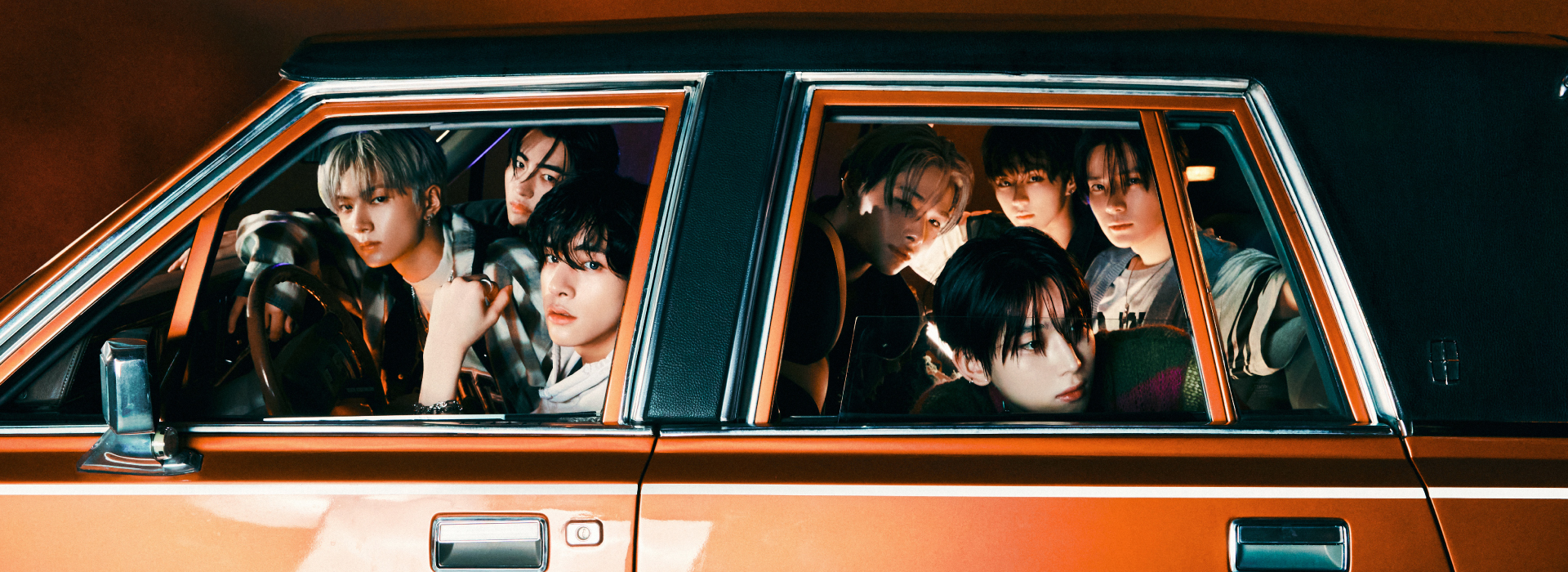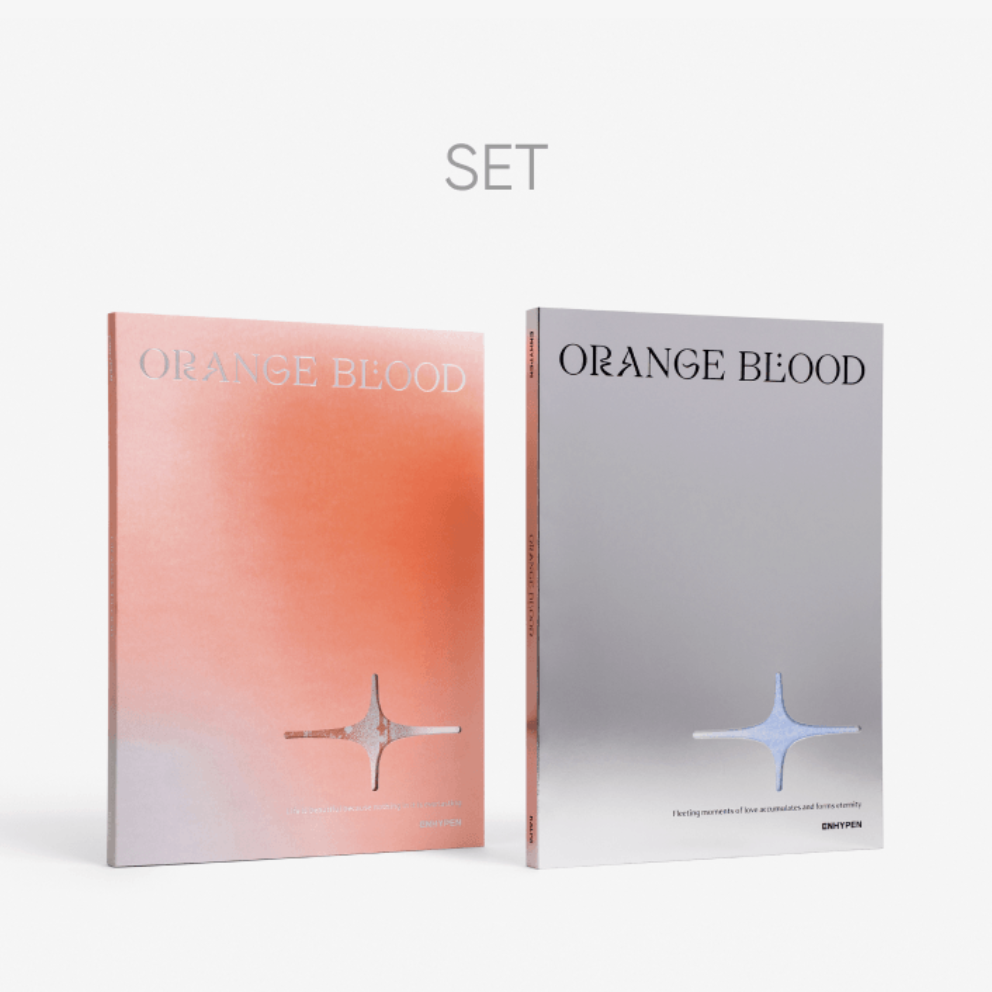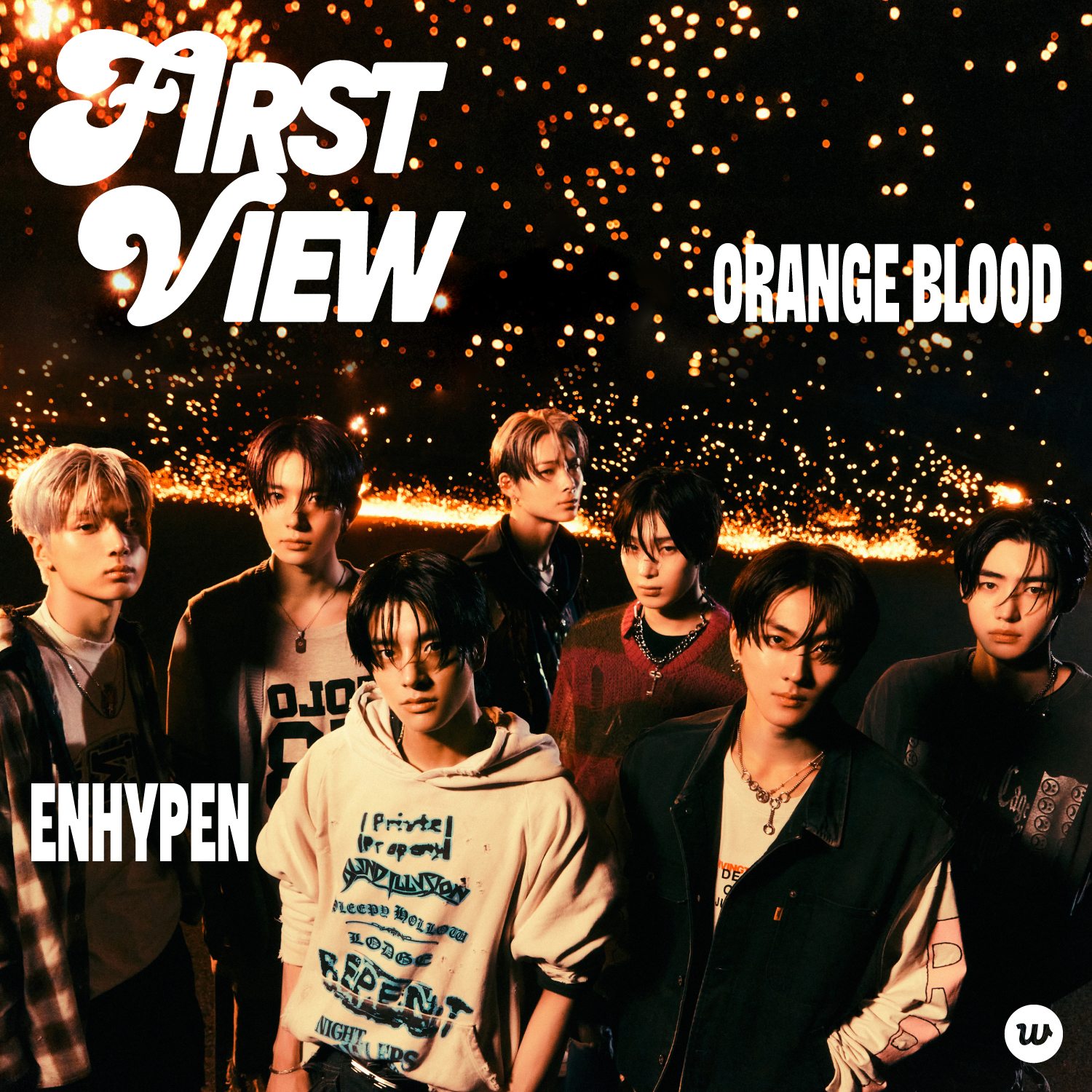
A vampire’s love
Myeongseok Kang: Vampires are immortal, and humans are unable to share that eternal lifetime with them. If a vampire falls in love with a human, they must carry the memory of that love around with them for all eternity. “To love you with all my heart in this moment, without any regrets,” ENHYPEN sings in “Mortal,” the opening track off their latest album, ORANGE BLOOD. To our human ears, it sounds like a simple and sincere declaration of love. But for a vampire, it’s a vow to accept the pain they’ll experience forever, all in the name of love. As shown in the comeback trailers for DARK BLOOD and ORANGE BLOOD, ENHYPEN is capable of performing otherworldly acts in their albums, like vampires. The feelings these immortal beings experience when they fall in love with mortals are surely ardent and true, but can they still be happy in spite of what will happen?
ORANGE BLOOD is an in-depth dive into the hearts and minds of immortal beings largely inaccessible to mere mortals. As the lyrics to “Mortal” make clear, an eternal being must give up the most fundamental part of their identity in order to love a human (“I blithely offered up my immortality for you”). A line like, “Take me to a new world,” from “Sweet Venom,” the new album’s lead single, echoes the familiar story of how vampires typically interact with humans in stories. But the “new world” in the song refers to the mythical being’s wish to “bring doom to” himself. Indeed, they say to the humans, “all I need is your poison,” hoping to feel it “spreading through my veins.” Where vampires were once a symbol of immortal fear and temptation for humans, now it’s the vampire who is being seduced by love. In the “Sweet Venom” choreography, the ENHYPEN members put their hands on their necks and slowly rotate their heads in a sensual movement reflective of someone who’s been bitten on the neck—and giving into temptation. The melody in the chorus as the word “sweet” is stretched and repeated sounds cheerful, but ENHYPEN’s vocals throughout the song are as eerie as a vampire in a horror movie. While the immortal being finds happiness in love, their identity as someone who lives in the dark and is feared by humans never disappears. Following “Sweet Venom” is the track “Still Monster,” where the group sings, “But I know / The abyss within me / Its mouth ajar / Waiting for me,” hinting at the near paradox of a vampire drawn in by mortal love. Having once terrorized humans, the vampire is now afraid he’s “still a monster” who has “the abyss within me.” For “a monster like” a vampire, to love and to “want” someone becomes something he “dares” to do, but it doesn’t matter—“in the end, the answer is only you,” ENHYPEN sings. It’s still a sad conclusion to come to, though—one that causes them to bury their tear-streaked faces in their hands and lower their heads, dancing alone in the end. The boys start out passionate as they sing, “Na na na na na na na na still a monster,” but their vocals turn sad by the end of the line, reflecting how ORANGE BLOOD recalls the whole story of this immortal being. These complex emotions—a mix of indescribable happiness, fear, joy of love, self-doubt, and anxiety around the privilege of love—come together to form a narrative that can only be described through a story of immortal vampires. ORANGE BLOOD is being billed as a part of ENHYPEN’s “next entertainment,” but it’s not just because of the album’s storyline or its use of vampires and visuals. The album takes a story about immortal beings and convincingly infuses it with pop music, forbidden love, happiness, tragedy, and fantasies referencing the present and the future in the real world. “Sweet Venom” gives listeners both upbeat pop melodies and a vocal direction that reflects the vampire character. At the same time, the straightforward bass and drums are an instant hook, and serve as the foundation for some seductive performances. In other words, the track is an exploration of how vampires continue to survive in pop culture—truly immortal creatures, it would seem.
Another of ENHYPEN’s songs, “Polaroid Love,” centers around a young person who tries to turn away from “love,” singing, “it’s a lame emotion,” but ultimately can’t help falling in love because “my heart beats achingly.” In a time when phrases like “nothing serious” and “serial dating” have largely replaced the word “love,” feeling the real thing is almost seen as a burden. Despite that, ORANGE BLOOD shows us vampires who are willing to give up their immortality for a shot at true love. And it looks like vampires aren’t the only ones who realize that love is finite these days: Endless love has long since become an “old-fashioned emotion” in the “Polaroid Love” era. But once actually falling in love, everyone hopes it will last forever. ORANGE BLOOD, in essence, sets out to show how precious this feeling is, however painful, through the love felt by an immortal being. The “Monster” loves with his whole heart, but in “Still Monster,” “she looks at me / Eyes without a hint of shadow … as if / Nothing happened.” Still, vampires can’t help but fall in love. They don’t want to be responsible for inflicting pain, but at the same time, they want to grow closer and closer. This explains why vampires have long been seen both as creatures to fear and as highly romantic partners, and why they’re seen as a return to young love—a love that might drive you so crazy your head could explode, but that can make you so happy that you can’t help but smile every time you see one another.
Carpe diem
Kim Rieun: If we look at the titles of ENHYPEN’s singles to date, they point to self-improvement and growth. “Given-Taken,” “Drunk-Dazed,” “Tamed-Dashed,” and “Blessed-Cursed” all used adjectives describing their existential concerns. When “Future Perfect (Pass the MIC)” came out, it was the first to prioritize a connection with each other rather than just their individual selves, and served to announce their goals, with lyrics like, “Put your weight on me.” The song “Bite Me” was another song that focuses on another person, in this case wanting to be “saved” by them. “Sweet Venom,” the lead single off their new album, ORANGE BLOOD, takes this a step further and is all about someone else—a special someone who will “bring doom to me” but, in doing so, becomes a savior. The song may seem contradictory, but it’s all made clear by HEESEUNG’s spoken part in the first track, “Mortal”: “What is an eternity without you? Give me this finite time to wander with you.” The ENHYPEN members are portrayed as having “fangs,” and in the HYBE Original Story DARK MOON: THE BLOOD ALTAR, which shares its narrative with the group’s music, the characters are explicitly shown to be vampires, unaffected by the passage of time. This all changes in “Sweet Venom,” when the boys vow to “give up eternity,” singing in a dreamy falsetto, “Right now to me only the taste of your / Sweet Venom” matters. For the first time, the members of ENHYPEN have accepted this human they sing to into their “veins,” and now they’re completely immersed.
But nothing sweet can stay. Although the bass line of “Sweet Venom” makes it a danceable song from the start, the melody, with its flat notes, seems to give the track a twist of something a little more bitter throughout. Paradoxically, however, it’s that anxiety that also makes everything as immersive as it is. In the KSANA version of the ORANGE BLOOD concept film, love is nothing more than a dark cloud or lightning tearing through the sky. Instead of staying indoors or in their car where it’s safe, the ENHYPEN members decide to run out into the storm. The core message of the album, as underlined in the track “Mortal,” is “carpe diem.” There’s more to life than just enjoying the moment—it’s about sticking out the anxiety and choosing to spend time with others. The existential angst is as real and present as ever, as in “Still Monster,” where the singer oscillates between being “still a monster” and “not a monster,” but the lyrics to “Blind” and “Orange Flower (You Complete Me)” show real dedication to being faithful in love, even when it’s plain that the moment can’t last forever: Although “both my eyes are blinded,” he will “exalt you” (“Blind”) and “every disappearing, fleeting moment / I’ll live to serve you” (“Orange Flower”). The ORANGE BLOOD Concept Trailer, based on DARK MOON: THE BLOOD ALTAR and directed by Yu Kwang Goeng, finds the ENHYPEN boys living after they’ve lost their immortality, enjoying the finite number of days allotted to a human life as they experience hurt and eating food with the character SOOHA. The ENGENE version of the concept film, meanwhile, is seen from SOOHA’s perspective. In this version, ENGENE—the group’s fandom—looks through the camera lens as the ENHYPEN members wave them over and stand around with them. ENHYPEN has long considered proving themselves to be a key part of their backstory, as far back as when they were on the Mnet audition show I-LAND. Now, they’re placing their fans at the center of a fantasy narrative developed around the group. That’s what the group means when they sing, “To love you with all my heart in this moment, without any regrets” (“Mortal”).
ENHYPEN’s vocals used to ring out as they sang about themselves or made an appeal to their listener. On ORANGE BLOOD, they sing in soft, breathy voices across a tracklist of easy, upbeat songs that favor rhythm and catchy choruses rather than dramatics bursting with high notes and dizzying climaxes. As their music moves away from a focus on the self to someone they wish to address, their growth as artists is evident, and the way they sing about love is natural and effortless. ENHYPEN’s narrative approach to music—a combination of fantasy and the artists’ real lives—seems to march to the beat of its own drum compared to the rest of the K-pop industry, which has tended to favor commenting directly on the spirit of the times lately. With ORANGE BLOOD, ENHYPEN has found a way to combine universal messages and authenticity in a fantasy setting, all packaged in a style that’s attractive to listeners—and expanding their “new world.”


Unauthorized reproduction and distribution prohibited.
- ENHYPEN Other Cuts2023.06.05

- ENHYPEN’s vampires just hit different2023.06.19

- K-pop comes to global festivals2023.07.21

- ENHYPEN plays Summer Sonic 20232023.09.07

